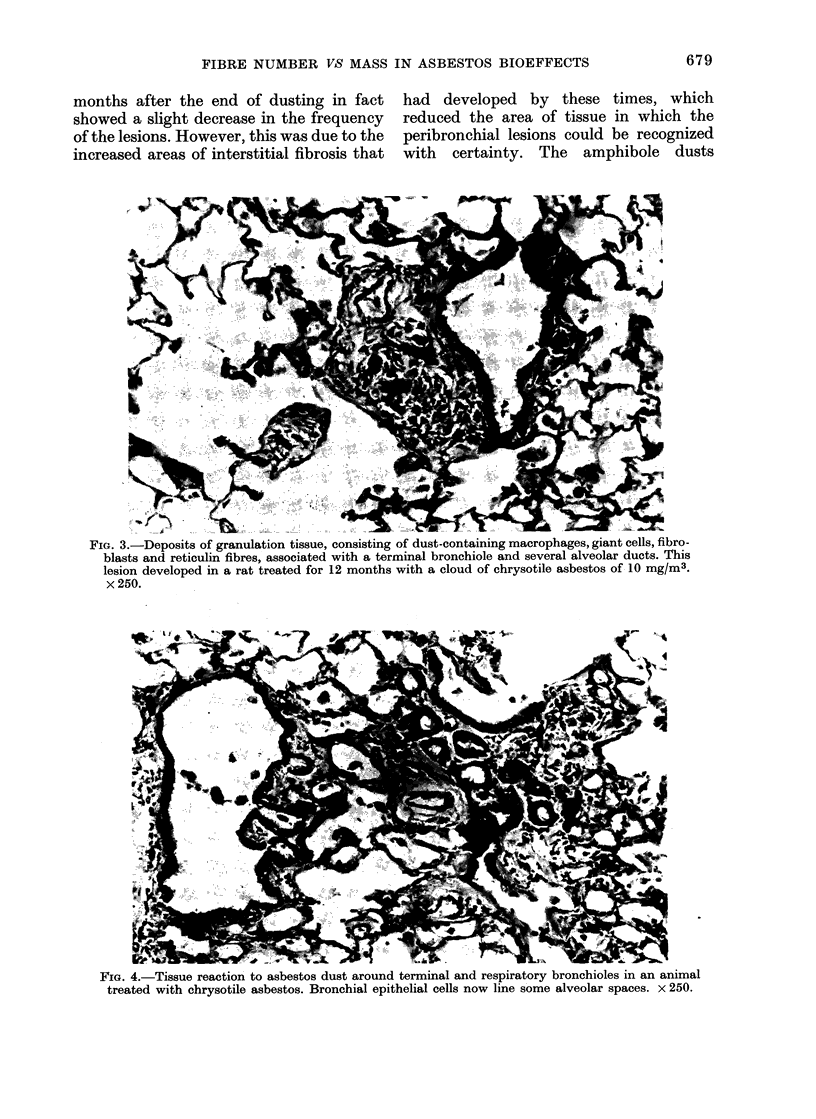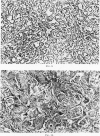Abstract
Five groups of rats were treated by inhalation for 12 months, with the U.I.C.C. preparations of the 3 main commercially used asbestos types, chrysotile, crocidolite and amosite. The experiment was designed so that the effects of both fibre mass and fibre number could be examined. The results indicated that chrysotile dust caused far more lung fibrosis than either amphibole type even when the fibre numbers in the dust clouds were similar. All malignant pulmonary neoplasms found during this study occurred in animals treated with chrysotile. The fibre-number calculations used for the generation of dust clouds were evaluated using the parameters recommended by the Health and Safety Executive in 1976, by which all fibres over 5 microgram long are counted using a phase-contrast light microscopy. When fibre-length distributions were calculated using a scanning electron microscope, however, it was found that the chrysotile clouds used in this study contained many more fibres over 20 microgram long than either of the amphibole clouds. The results, therefore, support previous suggestions that long asbestos fibres are more dangerous than short. They also indicate that neither a single mass standard, nor the present fibre-number standards are satisfactory.
Full text
PDF















Images in this article
Selected References
These references are in PubMed. This may not be the complete list of references from this article.
- Beckett S. T. The evaluation of airborne asbestos fibres using a scanning electron microscope. Ann Occup Hyg. 1973 Dec;16(4):405–408. doi: 10.1093/annhyg/16.4.405. [DOI] [PubMed] [Google Scholar]
- Beckett S. T. The generation and evaluation of UICC asbestos clouds in animal exposure chambers. Ann Occup Hyg. 1975 Dec;18(3):187–198. doi: 10.1093/annhyg/18.3.187. [DOI] [PubMed] [Google Scholar]
- Davis J. M. Histogenesis and fine structure of peritoneal tumors produced in animals by injections of asbestos. J Natl Cancer Inst. 1974 Jun;52(6):1823–1837. doi: 10.1093/jnci/52.6.1823. [DOI] [PubMed] [Google Scholar]
- Gross P., De Treville R. T. Experimental asbestosis. Studies on the progressiveness of the pulmonary fibrosis caused by chrysotile dust. Arch Environ Health. 1967 Nov;15(5):638–649. doi: 10.1080/00039896.1967.10664980. [DOI] [PubMed] [Google Scholar]
- Holt P. F., Mills J., Young D. K. Experimental asbestosis with four types of fibers: importance of small particles. Ann N Y Acad Sci. 1965 Dec 31;132(1):87–97. doi: 10.1111/j.1749-6632.1965.tb41092.x. [DOI] [PubMed] [Google Scholar]
- Jacobsen M., Rae S., Walton W. H., Rogan J. M. New dust standards for British coal mines. Nature. 1970 Aug 1;227(5257):445–447. doi: 10.1038/227445a0. [DOI] [PubMed] [Google Scholar]
- Klosterkötter W., Robock K. 1975 Yant Memorial Lecture New aspects on dust and pneumoconiosis research. Am Ind Hyg Assoc J. 1975 Sep;36(9):659–668. doi: 10.1080/0002889758507312. [DOI] [PubMed] [Google Scholar]
- Maroudas N. G., O'Neill C. H., Stanton M. F. Fibroblast anchorage in carcinogenesis by fibres. Lancet. 1973 Apr 14;1(7807):807–809. doi: 10.1016/s0140-6736(73)90604-1. [DOI] [PubMed] [Google Scholar]
- Reeves A. L., Puro H. E., Smith R. G. Inhalation carcinogenesis from various forms of asbestos. Environ Res. 1974 Oct;8(2):178–202. doi: 10.1016/0013-9351(74)90050-4. [DOI] [PubMed] [Google Scholar]
- Stanton M. F., Laynard M., Tegeris A., Miller E., May M., Kent E. Carcinogenicity of fibrous glass: pleural response in the rat in relation to fiber dimension. J Natl Cancer Inst. 1977 Mar;58(3):587–603. doi: 10.1093/jnci/58.3.587. [DOI] [PubMed] [Google Scholar]
- Stell P. M., McGill T. Asbestos and cancer of head and neck. Lancet. 1973 Mar 24;1(7804):678–678. doi: 10.1016/s0140-6736(73)92256-3. [DOI] [PubMed] [Google Scholar]
- Timbrell V., Hyett A. W., Skidmore J. W. A simple dispenser for generating dust clouds from standard reference samples of asbestos. Ann Occup Hyg. 1968 Oct;11(4):273–281. doi: 10.1093/annhyg/11.4.273. [DOI] [PubMed] [Google Scholar]
- Wagner J. C., Berry G., Skidmore J. W., Timbrell V. The effects of the inhalation of asbestos in rats. Br J Cancer. 1974 Mar;29(3):252–269. doi: 10.1038/bjc.1974.65. [DOI] [PMC free article] [PubMed] [Google Scholar]
- Wagner J. C., Skidmore J. W. Asbestos dust deposition and retention in rats. Ann N Y Acad Sci. 1965 Dec 31;132(1):77–86. doi: 10.1111/j.1749-6632.1965.tb41091.x. [DOI] [PubMed] [Google Scholar]









